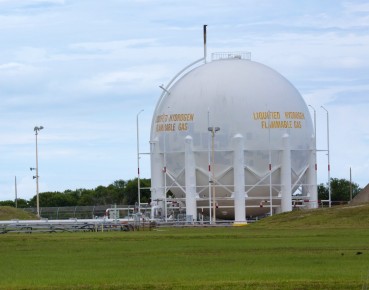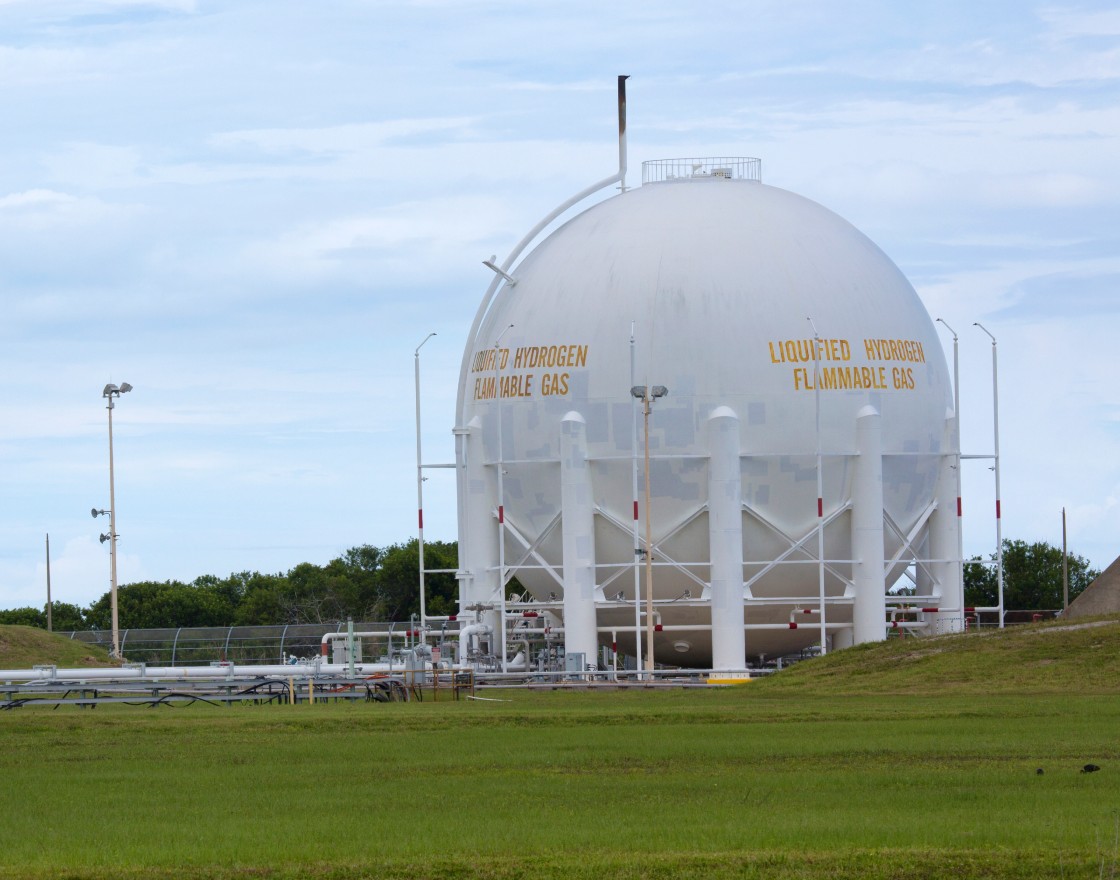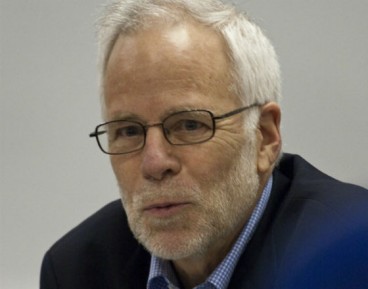Russia is too small to win the war in Ukraine
Category: Macroeconomics

Liquid hydrogen tank, Florida, USA (TomFawls, CC BY-SA 3.0)
In order to meet the aims of the Paris Agreement, European industrial companies will need to radically change production strategies and transition away from fossil fuels and toward hydrogen. Hydrogen is an up-and-coming fuel on the global energy market and as hydrogen production technologies develop this makes the process cheaper. The Hydrogen Council expects that by 2050, hydrogen could come to account for 18 per cent of global energy consumption.
According to the European Commission’s (EC) strategy presented in early July 2020, hydrogen fuel is to become an integral part of the EU’s energy system by 2030. Construction of electrolysis plants that will allow production of up to million tons of renewable hydrogen is expected in the next four years in the EU.
Eleven big European companies that have gas transportation and storage infrastructure, have already presented plans for the hydrogen future. It is reportedly planned to reequip Nord Stream 2 to hydrogen.
Companies in Russia and Germany have put forward a plan to build a hydrogen production plant as part of a plan to develop low carbon energy sources. The proposal, put forward by the German-Russian Chamber of Commerce, said the two countries should “take advantage of years of their successful partnership in the oil and gas industry to closely cooperate in the development of hydrogen.” Germany is ready to allocate EUR2bn for such projects involving international partners, including Russia.
Matthias Schepp, the head of the Chamber of Commerce, said Germany and Russia had ratified the Paris climate agreement and should take concrete action to develop low carbon energy. “German-Russian cooperation in the field of hydrogen technology will make a decisive contribution to a carbon-neutral world,” he said. “We have to take this unique opportunity to become a technology leader and to shape the future of Russian and German energy companies.”
“Russia and Germany should take advantage of years of their successful partnership in the oil and gas industry to closely cooperate in the development of hydrogen and climate-friendly technologies for the future,” the proposal sent to relevant ministries of both countries said. “As a pilot project, the two countries should start by building a hydrogen production plant,” Mr. Schepp said.
The hydrogen initiative would expand the Russian-German energy partnership announced in February 2020, and allow for a reduction in global greenhouse gas emissions in line with the Paris climate deal.
Germany has become a pioneer in hydrogen technologies. At present it is planning a further investment of EUR9bn, of which EUR2bn is earmarked for cooperation with international partners. Mr. Schepp said Russia, as a “superpower for raw materials with huge water reserves” would be an ideal partner for hydrogen cooperation.
The German government released its long-awaited national hydrogen strategy in the summer. The publication sparked a discussion about whether hydrogen was a better means than wind, solar and batteries to power cars and heating systems. Several NGOs said its use should be restricted to vehicles that cannot be powered directly by electricity, such as ships and planes, since electric cars were more efficient.
Meanwhile, much of Russia’s economy depends on the export of oil, gas and coal, and Russian leaders are trying to reorient Russia toward a much more diversified energy sector. To this end, starting from 2021, the government intends to build the country’s reputation as a hydrogen supplier, aiming to make exports of the world’s most abundant gas a large part of its energy sector. Gazprom estimates that by 2050 the European market for hydrogen may be EUR153bn.
“There have been efforts in this regard since the early 2000s, when a number of research and development projects were started in the hydrogen space. The Russian company Norilsk Nickel invested USD40m specifically for this purpose,” a CMS report reads. However, during the financial crisis oil prices plummeted, and all research in hydrogen energy in Russia was suspended and Norilsk Nickel stopped financing the project.
At present hydrogen is produced in Russia primarily for use in oil refinery, steel and chemical industries. There are several producers of hydrogen, most of them being subsidiaries of world’s leading brands such as Praxair, Air Liquide and Linde. In Russia hydrogen is often produced directly at the plant where it is used.
In November 2019, the first hydrogen fueled tramway was tested in Saint-Petersburg. However, this is still far from implementation of a full-scale use of hydrogen-powered transport. According to a report prepared in 2019 by the infrastructure center EnergyNet, in order to create a hydrogen energy sector in Russia by 2025-2035, investments of up to USD3.9bn per year will be necessary. Such investments, however, have the potential to produce an annual profit of up to USD3.1bn. It is likely that in relation to hydrogen projects, investors will apply the same financing approaches as used in energy sectors such as oil and gas. As such there could be a combination of both equity and debt financing typically using standard project financing such as bank credit facilities, with equity financing currently being the more preferable option.
The state-owned energy companies Gazprom and Rosatom have been instructed by Russia’s energy ministry to establish large-scale hydrogen production capacities by 2024. Europe is envisioned as the top export market. In a first step, Gazprom reportedly wants to add up to 20 per cent of hydrogen to the natural gas flowing through older pipelines in its network and might increase the share to up to 70 per cent in newer ones like the offshore link connecting Russia with Germany through the Baltic Sea.In 2024, Russia’s gas giant Gazprom will start producing “clean”, zero-emission hydrogen, under a government plan outlined in July 2020 to develop a hydrogen economy. Gazprom predicts this move would help reduce EU carbon emissions 62 per cent by 2050. The EU’s total goal is 80 per cent. The plan sees Gazprom building and beginning to test a methane-hydrogen-powered turbine next year, and until 2024 it will also study different applications of hydrogen as a fuel, in gas boilers and gas turbines, and as a fuel for vehicles.
Russia’s energy strategy envisions export of 200,000 tons of hydrogen by 2024, and 2 million tons by 2035. “However, despite the potential to become a large producer of hydrogen from natural gas, Russia will still face the pressure of green regulation,” Alexei Grivach from Russia’s National Energy Security Fund warns.
„Russia lacks a distinct strategy for development of renewable energy resources both at the state level and at the level of companies. Europe, as well as European generating and oil and gas companies, are doing far more in this respect. Theoretically, in the long-term Europe can manage to strongly increase green energy production and reduce gas consumption, particularly cut the demand for Russian gas imports. In this sense renewable energy resources and hydrogen indeed can compete with the Russian gas, though that is an issue of not the next ten years, but more likely 20-30 years,” Fitch group director Dmitry Marinchenko said.
Gazprom will not be the only one involved in the hydrogen drive. Rosatom, the country’s nuclear power major, will start testing hydrogen as fuel for trains in 2024. Russia’s largest private gas company, Novatek, is also interested in taking part in the hydrogen initiatives.
However, the natural gas infrastructure would need to be substantially adapted to be able to transport hydrogen. CMS notes that there are no dedicated state support measures or incentives relating to the hydrogen industry in Russia. Gazprom is looking to develop and test a new hydrogen turbine this coming year. Germany will find this interesting in light of the emerging energy partnership between Siemens and Gazprom Energy Holding.
But until enough environmentally sustainable hydrogen is available, the gap could be plugged by hydrogen manufactured via the chemical transformation of natural gas, a process called steam-methane reforming. In the case of Nord Stream 2, that transformation could take place at source in Russia. The CO2 thus released could conceivably be pumped back into the ground in the Russian gas fields and the hydrogen could then be sent to Europe via the pipeline. Benefits for the climate could be enough to unite Europeans and weaken the US position.
“As to the hydrogen option, I am skeptical about it,” said Mateusz Kubiak from Warsaw-based Esperis. “A hydrogen-switch is currently not an option for Nord Stream 2 and it still won’t become the one for many years. Any plans to blend hydrogen into the gas through the Nord Stream 2 will have to be properly studied and will require addressing lots of absolutely crucial issues first. Where and how the hydrogen would be produced in Russia? How will it be transported through Russia and will that be economically feasible at all? Will the consumers in Europe need hydrogen blended into the Russian gas? How German infrastructure should be adapted to actually handle Russian hydrogen-natural gas blend transmission?” Mr. Kubiak said.



